Yup, I literally think you and I could’ve done a better job if they let us call the shots starting from Jan 1USA could have ended this

now shyts hit the fan..
What a fukked up week for Friday the 13th to land on ..

Yup, I literally think you and I could’ve done a better job if they let us call the shots starting from Jan 1USA could have ended this



Coronavirus: health researchers urge global authorities to consider broadening use of face masks
A number of researchers have urged health authorities to reconsider their recommendations that only the sick should wear a face mask in public spaces.
As the coronavirus has spread to more than 110 countries, the world can’t seem to agree on whether everyone should wear a face mask.
While masks are a common sight in China and many other parts of East Asia, European and American authorities have advised only the ill to wear a mask when they go out.
A review by Inkstone found that only three of the nine countries most affected by the coronavirus recommend people without respiratory symptoms to wear a mask to prevent the spread of the virus, especially in crowded places.
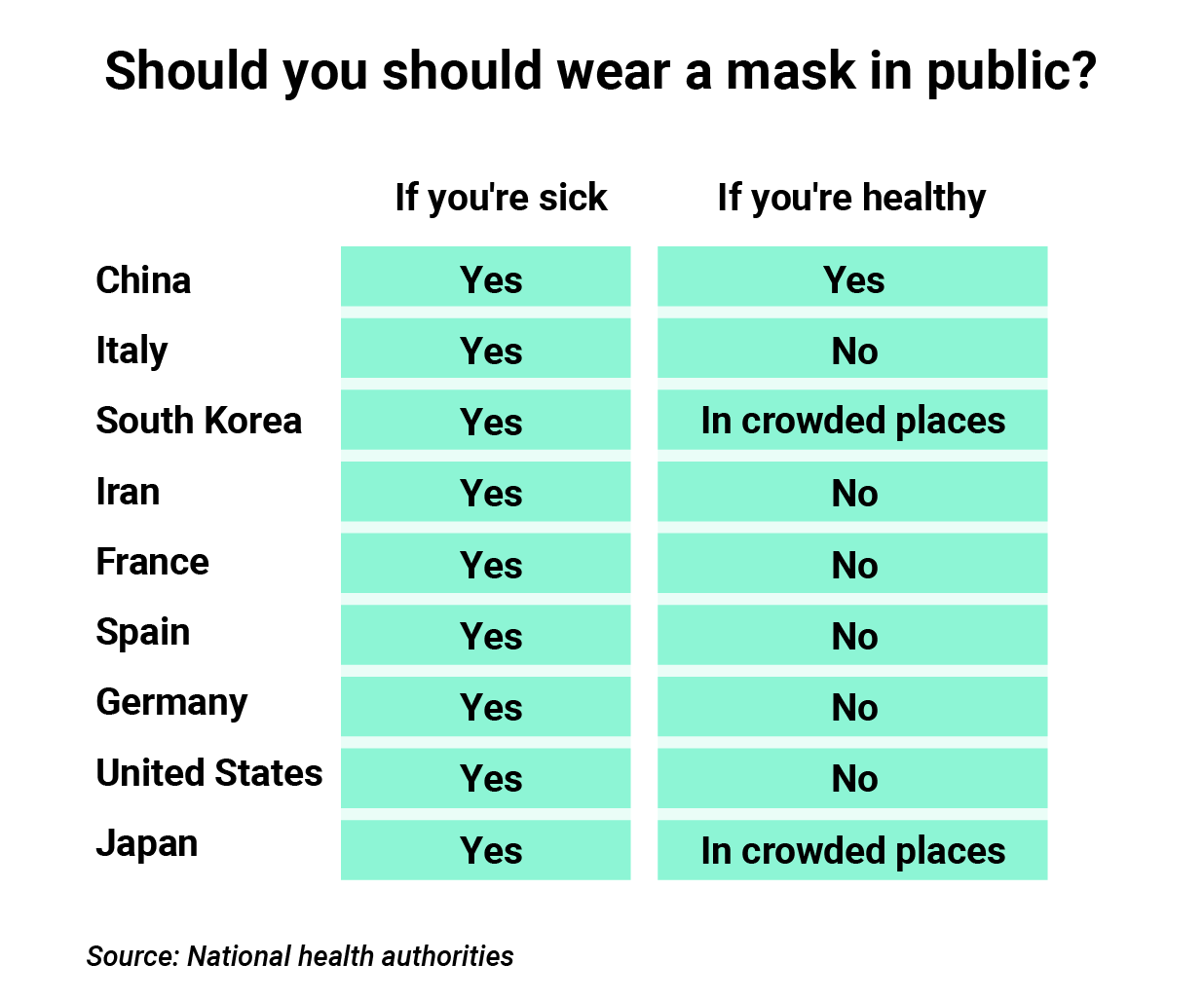
As the spread of the virus accelerates outside East Asia, some experts have called on global health authorities to rethink the role of masking.
In an article published in the medical journal Lancet, a group of health researchers argued that the coronavirus has “defied conventional containment strategy” because patients at the early stages of infection may have no or only vague symptoms while being infectious.
“People wear masks to protect themselves in close person-to-person contacts, but unintentionally, they are protecting each other through source control,” said Chi Chiu Leung, Tai Hing Lam and Kar Keung Cheng in the March 3 article.
Asymptomatic transmission
Since late January, Chinese authorities in major cities have enforced rules on wearing face masks in public spaces, including by detaining those who tried to use public transport without a mask.
China recognizes the need to control the spread of the disease, known as Covid-19, by asymptomatic patients, Dr DJ Hamblin-Brown, vice-president of medical affairs at United Family Healthcare in Beijing, told Inkstone.
The term refers to people who have contracted the virus but do not have symptoms, such as cough and fever.
Researchers have estimated that most patients develop symptoms five days after infection, with the so-called incubation period ranging from one to 14 days.
Asymptomatic transmission has been reported in multiple countries, in which a spreader is responsible for sickening others without knowing it.
In January, a cluster of 13 infections was believed to have started with a British man who contracted the virus during a business trip in Singapore and spread it to others on a skiing trip to the French Alps and back home in the United Kingdom, all the while showing no signs of infection himself.
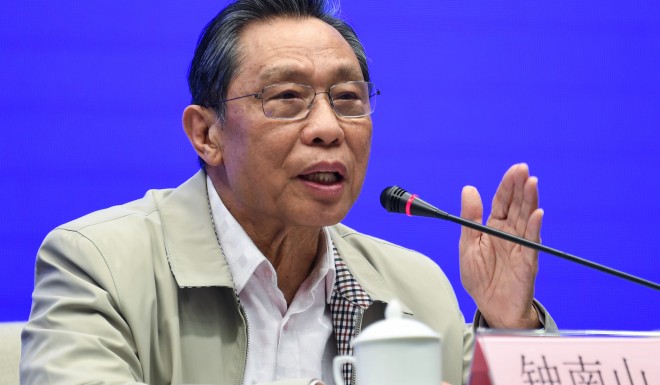
Dr Zhong Nanshan, a renowned doctor involved in China’s response to the 2003 Sars outbreak, suggested in late January that people should wear face masks as a precautionary measure. Photo: Xinhua/Deng Hua
Protecting others
The World Health Organization suggests only people who have respiratory symptoms should wear a mask and has warned against misuse that could increase the risk of infection, such as by transferring pathogens from your hands to your face.
But Professor Yuen Kwok-yung, a microbiologist at the University of Hong Kong and an advisor to the city’s Covid-19 taskforce, has argued for a broadened use of the mask.
"Wearing a mask not only protects yourself, but also protects others in case you are an asymptomatic patient,” Yuen told the Chinese news outlet Caixin.
A World Health Organization spokesperson told Inkstone they are aware that some people may have the ability to pass the virus to others before they develop symptoms.
“There is much we still don’t know about this virus and WHO is monitoring new data carefully,” said the spokesperson.
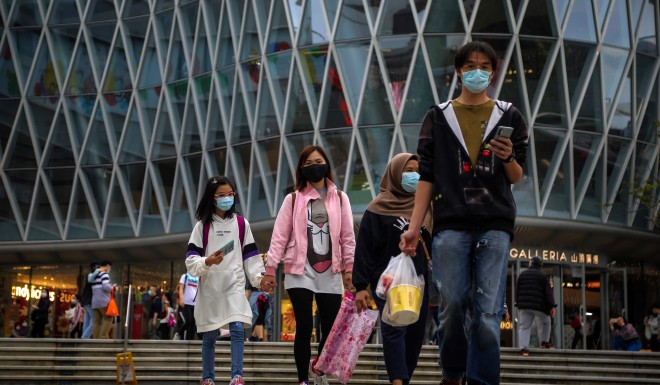
Masks are a common sight in Hong Kong. Photo: AFP/Vivek Prakash
Do face masks work?
Studies around the world have shown that wearing a face mask can be effective in preventing infectious respiratory diseases, such as influenza.
A 2014 study in Japan showed that wearing face masks can reduce one’s chances of getting the flu.
Researchers divided 10,500 participating school students into two groups: one that wore masks and another that did not. They found that masked students were significantly less likely to be infected.
And a 2016 analysis of 25 studies conducted between 1999 to 2014 about the use of face masks during the hajj, an Islamic gathering attracting more than 2 million people every year, concluded that masks offered “significant protectiveness” against respiratory infections.
In the case of coronavirus, some experts said that masks could block the droplets of saliva that carry the virus and reduce the chances of infection, even though the pathogens are small enough to penetrate the masks.
“Getting infected is an accumulative process. If someone inhales a large dose of viral droplets in one go, they may become infected,” said Changshou Hang, 82, a retired virologist at the Chinese Center for Disease Control and Prevention.
“If you are wearing a face mask, viral droplets can still get to you, but it will be in much less dosage.”
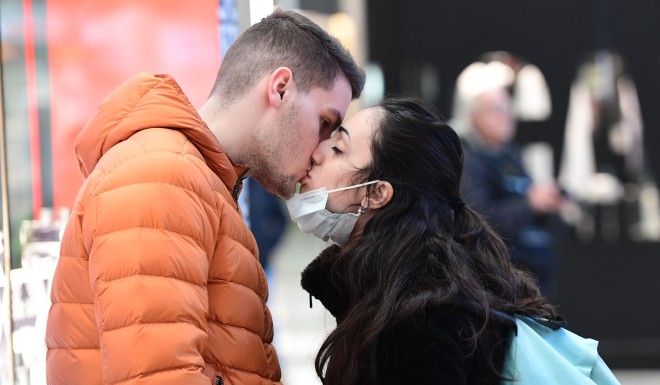
Italy has asked people to stop greeting each other by kissing of shaking hands to prevent the spread of the coronavirus. Photo: AFP/Miguel Medina
The cultural dimension of masking
In November 2014, a Canadian in Tokyo baffled by the common sight of surgical masks wrote to an advice columnist in the Japan Times.
“What the heck is the deal with people in Japan wearing surgical masks?” asked Allan M.
“Where I come from (Canada), only doctors, dentists and other health professionals wear masks, and only on the job. You never see anyone out in public wearing a face mask. In fact, if you tried to enter a store with one on your face, you’d be mistaken for a robber and someone would call the police.”
The question touches on the cultural aspect of masks that has been widely acknowledged by public health researchers and social scientists.
“In Asian countries, it is common to see individuals who are wearing masks. It is culturally accepted,” said Keiji Fukuda, a director at the school of public health at the University of Hong Kong. “In many Western countries they simply do not believe promoting healthy people to wear masks is useful.”
While the medical use of masks goes back to the response to the Spanish flu of 1919, mask-wearing has become a general practice in Japan since the late 1990s owing to a combination of cultural and political pressures, the sociologists Adam Burgess and Mitsutoshi Horii wrote in 2012.
In the recent Lancet article, the authors suggest that cultural pressure can help prevent the spread of the coronavirus by even symptomatic patients.
“If everyone puts on a mask in public places, it would help to remove stigmatization that has hitherto discouraged masking of symptomatic patients in many places,” they said.
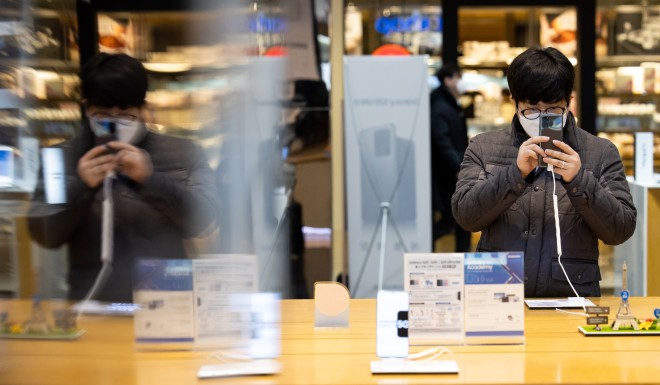
South Korea has advised healthy people to wear a mask in crowded places. Photo: Bloomberg/SeongJoon Cho
Mask shortage
Health authorities that do not recommend healthy people to wear masks have often cited the need to maintain supply for those who need them most.
The World Health Organization estimates demand for face masks has gone up 100 times since the coronavirus outbreak, creating a worldwide shortage that it said could put health workers’ lives at risk, a concern that was acknowledged by the writers of the Lancet article.
But if surgical masks aren’t available, some health experts and authorities said other face coverings could work in their place.
“Masks are not magic. They are just a bit of cloth covering the face,” said Brown from United Family Healthcare.
“You can use a handkerchief or scarf and it will prevent droplet spread as well as a surgical mask. These should, and can, be washed daily at 60°C (140°F) and preferably not handled when in use.”
Brown said the public should avoid hoarding or using heavy-duty protective gear such as N95 masks, as they should be reserved for health workers.
On March 4, South Korea’s Ministry of Food and Drug Safety revised its guidelines on face masks to recommend the reuse of cotton or disposable face masks as a temporary measure.
Ask that christian cult in south korea how that worked out lol.Will praying against the virus work?
If you use hand sanitizer first maybeWill praying against the virus work?
I think it’s best you postpone your big day brehMan.... My wedding is in 2 1/2 weeks


Facts are facts, white boy. Some of us are not brainwashed by coincidences. @HarlemHottie This poster is white ^^^ Keep that in mind. You know the same race of people who brought diseases historically which disseminated the Native American indigenous population through their own failure to have adequate hygiene and dietary standards. That race never accepts responsibility for shyt. It’s always “the minorities” even though research has shown different. Roanoke, Black Plague, Bubonic Plague, Black Death, Great Plague of Milan, Plague of London, Smallpox, Great Plague of Vienna etc etc
 Coli- white or real life white? "White" when necessary to blend in or actually white?
Coli- white or real life white? "White" when necessary to blend in or actually white? 
